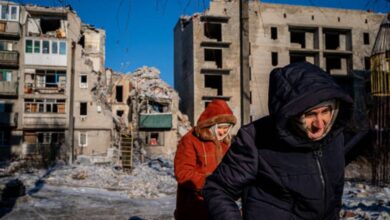‘My body was burning’: Russian journalist’s horror journey in grips of suspected poisoning

“If you’re a journalist and the government wants to kill you – you’re doing it right”.
Those are the chilling words of broadcaster Irina Babloyan, who until Vladimir Putin’s invasion of Ukraine hosted Russia’s most popular morning radio show.
But stalked by the FSB and taken off the air within days of the war starting, the journalist felt compelled to leave Moscow for her own safety.
Little did she realise, like so many of Putin’s critics, she would also suffer symptoms of suspected poisoning that left her skin “burning all the time”.
Established prior to the collapse of the Soviet Union, Russia’s sole major independent radio station Echo of Moscow was taken off air in March 2022, during the Kremlin’s clampdown on information, and then shut down completely.
Events soon took an even darker turn. Late one evening, near her home, Ms Babloyan was out walking with her close friend, opposition politician Ilya Yashin, when he was arrested. He was later sentenced to eight and a half years in prison, over a YouTube livestream about Russian atrocities in Bucha.
From that moment, she says Russian police and FSB agents followed her everywhere – even some 350 miles south to Belgorod – and openly sat outside her home, threatening her that “it’s probably better for you to leave”.
It was as she began to investigate early reports of Ukrainian children being forcibly taken to Russia that the personal danger to Ms Babloyan intensified.
She approached Russian government officials, who told her they were aware of the situation and that the children would remain in the country until the war was over.
While she was initially aware of just one “school” housing Ukrainian children in Russia, the findings soon snowballed until she learned from a fellow journalist of dozens more facilities, holding thousands more. Ukraine’s current figures suggest at least 19,000 children have been taken.
“I was really shocked and I understood: okay, probably it’s time for me to leave,” Ms Babloyan said, adding: “I was so tired and felt I couldn’t change the situation.”
She returned to her home country of Georgia in October, amid another Russian exodus sparked by Putin’s mobilisation order.
With Echo of Moscow set to resume programming via its app from Berlin, the journalist planned to move to there – in a journey requiring her to drive to Armenia, before flying from Yerevan to Moldova, and then on to the German capital.
On the eve of the long trip, she suddenly “felt something strange going on”.
“In a second”, she began to feel nauseous and tired. “I had dinner with friends – I didn’t want to eat, I didn’t want to drink, I ordered salad and wine, and didn’t [touch] it at all. I decided to go to bed, went to my hotel and fell asleep.” It was the last time she would sleep for three days.
Ms Babloya was treated at the same Charite hospital as Navalny
She awoke feeling “much worse”, recalling: “I couldn’t move normally – every single movement was very hard.” She felt a metallic taste in her mouth, with “crazy” pain in her head and “in a strange place” in her stomach, while her hands and feet had turned “wine red”.
“I couldn’t move my fingers normally, and I felt like [I was] touching fire in [my] hands and feet,” Ms Boloyan said.
Blaming hitherto dormant allergies, she bought some antihistamines, packed a bag and embarked on a four-hour taxi journey to Yerevan.
Save for the border crossing, she lay on the back seat for the entire journey, unable to move. “Every single piece of my body was burning. I couldn’t think normally, couldn’t concentrate on anything.”
Russian opposition leader Alexei Navalny with his family in a Berlin hospital
Ms Babloyan interviewing Elena Kostyuchenko on her Echo of Moscow show





